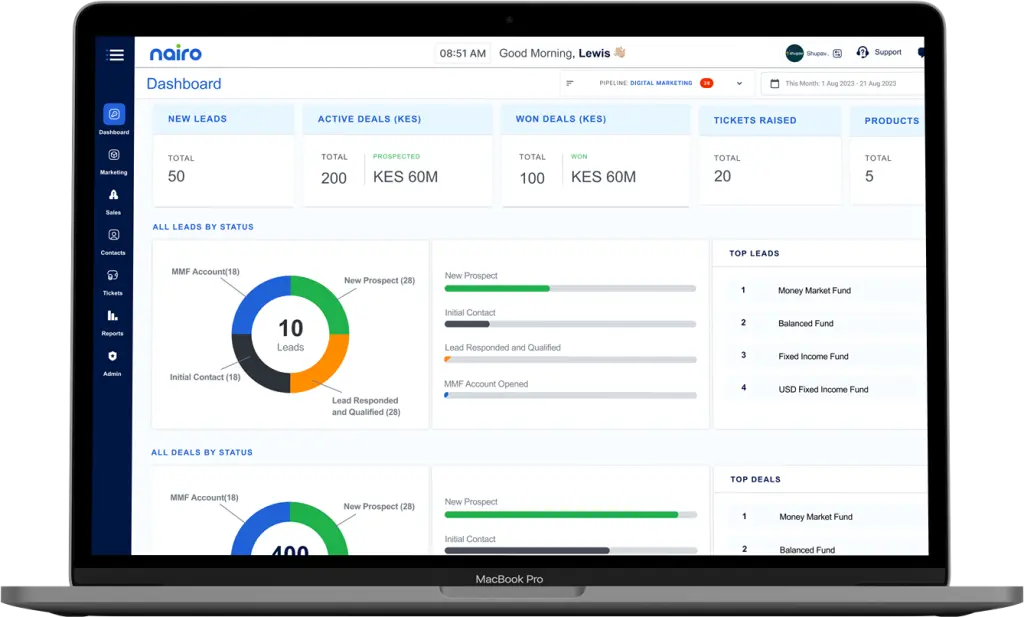Technology (and business needs) are evolving rapidly, and Customer Relationship Management tools are no exception. If you’re in the market for a CRM or reevaluating your current one, you might be wondering: what should a modern CRM offer in 2025? What features or qualities will ensure you’re not choosing a tool that becomes outdated in a year or two?
Whether you’re an African SME looking to upgrade from a basic system or a first-time CRM adopter, this guide will walk you through the key things to look for in a CRM in 2025. The goal is to future-proof your choice – pick a solution that will serve you well not just today, but for years to come, and keep you ahead of the curve.
The CRM Landscape in 2025: A Quick Overview
Before diving into specifics, it helps to understand some big-picture trends shaping CRM software:
- AI-Powered Everything: Artificial intelligence is making its way into CRM platforms, offering smarter automations, predictive analytics, and even AI-driven content generation. A 2025-era CRM leverages AI to help you work faster and make better decisions.
- Omnichannel and Integration: Customers communicate via more channels than ever (email, phone, WhatsApp, social media, SMS, etc.). Modern CRMs aim to integrate these channels into one cohesive view. Also, CRMs are increasingly expected to “play nice” with other software (accounting systems, marketing tools, etc.) via robust integrations or APIs.
- User Experience & Accessibility: The workforce is getting younger and more tech-savvy. They expect software that is intuitive, as easy to use as the apps on their phone. Also, mobility is a given – a CRM must be accessible on the go. Businesses also seek solutions that don’t require heavy IT support – cloud-based, easy sign-on, and flexible.
- Data Privacy and Security: With regulations like GDPR, POPIA, and others, plus a general rise in data awareness, a CRM in 2025 needs strong security and compliance features. You want to ensure customer data is protected and handled properly, or you risk legal and reputation issues.
- Local Adaptation: As more markets adopt CRM, there’s an understanding that one size doesn’t fit all. We’re seeing a rise of regional or industry-specific CRM solutions. In Africa, for instance, there’s a push for tools that understand local business practices. So in 2025, you might be considering not just the big global names, but also local players (like NairoCRM) that tailor to your context.
With that backdrop, let’s list the specific things you should look for when evaluating a CRM solution in 2025:
1. Ease of Use and Quick Onboarding
No matter how feature-rich a CRM is, it’s worthless if your team doesn’t use it. In 2025, there’s no excuse for clunky, user-unfriendly software. Look for a CRM with:
- Intuitive Interface: The layout should make sense, and common actions (adding a contact, updating a deal stage, logging a call) should be straightforward. Modern CRMs often take cues from consumer apps to minimize training needs.
- Personalization: Can each user customize their dashboard or views to suit their workflow? In 2025, personalization isn’t a luxury – it’s expected, so each team member can optimize their own usage.
- Learning Resources: Check if the CRM provides built-in guides, tooltips, or an onboarding checklist for new users. Some platforms even have interactive tutorials. A short learning curve is key. You want your team up and running in days, not months.
- Supportive Community or Support: Since we’re in a time where users like to self-serve, see if there’s an active user community or easily searchable knowledge base. When someone has a question, getting an answer should be quick (either from documentation or responsive support).
Ask the vendor for a trial or demo and involve the actual end-users. If your sales rep finds the CRM confusing in the demo, that’s a red flag. In 2025, go for a CRM that people enjoy using – it will ensure high adoption and consistent data entry.
2. Mobile Accessibility and Remote Work Readiness
Your CRM should travel with you. Business doesn’t only happen at the office desk – especially true in many African markets where face-to-face meetings, site visits, and field sales are common. Key things to check:
- Quality Mobile App: Does the CRM have a robust mobile app (for Android and iOS)? Test it. Ensure it can work offline or in low connectivity (syncing later when back online). A good mobile CRM app allows you to add notes right after a meeting, pull up client info on the spot, and even get notifications/reminders on your phone.
- Responsive Web Interface: If they don’t have a dedicated app, at least the web version should be mobile-friendly for tablets or phones.
- Remote Collaboration: Features like tagging colleagues, assigning tasks, or team comments on records help a distributed team work together. In 2025, remote and hybrid work is the norm rather than exception, so the CRM must facilitate collaboration without everyone being in one room.
- Cloud-based Convenience: This is almost a given now, but ensure the CRM is cloud-based (so your team can log in from anywhere). If you have to install servers or worry about on-premise maintenance, that’s probably not the direction most are going in 2025 (unless you have very specific needs).
A CRM that’s “mobile and remote ready” means your sales won’t pause just because someone is out in the field or traveling. It keeps productivity high and responsiveness sharp.
3. Integration with Communication Channels (Omnichannel CRM)
Customers might reach out to you via email, then WhatsApp, then a phone call. You want a CRM that can tie these threads together. Look for:
- Email Integration: Most CRMs connect with email (Gmail, Outlook, etc.) to log conversations automatically. In 2025, advanced systems even use AI to summarize email exchanges or suggest next actions.
- Telephony/VOIP Integration: If you do a lot of phone calls, consider if the CRM can integrate or at least log call info (some have autodialers or can log call duration and notes easily). If it integrates with services like Twilio or has built-in call capabilities, even better.
- Social Media & WhatsApp: This is critical in an African context. Check if the CRM has or plans integrations with WhatsApp Business API, Facebook Messenger, or other relevant social channels for your industry. Being able to track those interactions in the CRM is a huge plus. An omnichannel CRM ensures if a client messaged you on WhatsApp, the info is right there alongside their emails and meeting logs.
- Marketing Integration: Think about how the CRM fits with your marketing efforts. Does it integrate with your website (for lead capture forms)? Can it connect with an email marketing tool or SMS marketing platform? In 2025, bridging sales and marketing data is crucial for a seamless customer journey.
The keyword is omnichannel – a CRM should serve as the central hub for all customer interactions, regardless of medium. This ensures no communication is lost and you maintain context in conversations.
4. Automation and AI Capabilities
A modern CRM should do more for you, not just store data. Automation is key to efficiency, and AI is the new frontier. Here’s what to consider:
- Workflow Automation: Look for features like automatically assigning leads based on certain criteria, sending a welcome email when a lead is added, creating follow-up tasks after a meeting is logged, etc. These save time and ensure consistency. For example, NairoCRM is focusing on easy automation setups for common sales workflows so you don’t have to manually repeat routine steps.
- AI Insights: Does the CRM provide any AI-driven insights? For instance:
- Lead Scoring: Using AI to predict which leads are most likely to convert, so you focus on the hottest opportunities.
- Deal Predictions: Some CRMs analyze past data to guess which deals might be stalling and why.
- Next Best Action: Suggestions like “It’s been 10 days since you last contacted Client X, consider reaching out” or “Lead Y has opened your last 3 emails – time to call?”
- AI Assistance: Emerging features might include AI chatbots integrated for initial customer queries (especially if the CRM has a service/support module), or AI composing email drafts for you based on context. While you might not need all the fancy AI bells and whistles, a CRM in 2025 should at least be leveraging AI in the background to help crunch data and surface useful info (like forecasting sales or analyzing customer sentiment in communications).
- Task and Reminder Automation: Beyond big AI, simple automations like task reminders, alerting managers if no action on a high-value deal in X days, etc., are must-haves. The CRM should feel like a smart assistant, not just a database.
According to tech trends, CRMs that incorporate AI and automation tend to increase salesperson productivity significantly, because they take care of the little things and let your team focus on building relationships and closing deals. So definitely weigh this factor.
5. Customization and Scalability
Your CRM should be able to adapt to your business, not force you into a mold. And as your business grows, the CRM should scale without a complete overhaul.
Key points:
- Custom Fields and Flexibility: Ensure you can add custom fields or modules to track information unique to your business. If you need to track something special (e.g., ID numbers, referral sources, product serial numbers, whatever), the CRM should allow it. Also, can you modify deal stages or pipeline steps easily? In 2025, most good CRMs allow a high degree of configurability without needing a developer.
- Process Customization: Beyond fields, can you customize workflows? For instance, set up an approval process for discounts, or integrate your sales process steps into the CRM (so it mirrors how your team actually sells).
- Scalability of Users and Data: If you plan to double your team, is it easy to add new users? (and affordable, tying back to pricing considerations). Also, check if there are limits on records (some CRMs have tiered limits on how many contacts or how much storage you get – make sure it can handle your growth projections).
- Upgrades and Modules: Some CRM systems have add-on modules (like if you later want to add a helpdesk or inventory management). Consider if having that expansion possibility is important to you. In 2025, many CRM platforms aim to be all-in-one (offering sales, marketing, and service capabilities), or at least integrate smoothly with specialized tools for those functions.
The idea is to choose a CRM that won’t just fit you now, but can be tailored as your needs evolve. A startup’s needs are different from a mid-size company’s needs. Ideally, the CRM can accommodate that journey.
6. Data Security, Privacy, and Reliability
Trusting a CRM with all your customer info means you must trust its security and reliability. In 2025, with cyber threats and strict data laws, pay attention to:
- Security Features: Does the CRM offer role-based access (so you can control who sees what)? Two-factor authentication for logins? Regular backups of data? These are important. Also, what’s their record on security – any past breaches? A secure CRM will proudly talk about encryption and safety measures.
- Compliance: Depending on your customer base, you might need compliance with laws like GDPR (for EU clients’ data) or local laws for data protection. Ensure the CRM has features to help comply (e.g., ability to delete customer data upon request, tracking consent for communications, etc.). If a CRM is marketed globally, they likely have GDPR compliance tools; regionally, check for things like POPIA readiness if in South Africa.
- Data Location: For some businesses or countries, where the data is hosted can be a concern (some prefer data hosted in-country for compliance). Check if the CRM vendor discloses data centers and can accommodate any data residency needs.
- Uptime and Support: A reliable CRM should have a good uptime track record (you don’t want the system frequently down when your team needs it). Often, vendors publish uptime stats or have an SLA. And if something does go wrong, how fast is support to respond? Look for 24/7 support or at least very prompt support during business hours, given that your sales ops are mission-critical.
- Exportability: Slightly different angle, but worth mentioning – ensure you can export your data easily. You don’t want vendor lock-in. A good CRM will let you back up your data or export contacts, etc., anytime. This is part of data control which is your right.
Security and reliability might not be glamorous, but they are like insurance – you’ll be very glad for it if something goes awry. It’s worth asking these questions upfront.
7. Vendor Reputation and Roadmap
Finally, consider the provider itself:
- Reputation and Reviews: In 2025, you can find plenty of user reviews and case studies about most CRM products. See what other businesses similar to yours say. Do they stick with it or churn quickly? A CRM that has loyal customers likely delivers value.
- Local Presence: If you’re an African SME, you might prefer a CRM whose company has some local presence or understanding (for the reasons we discussed in earlier articles). NairoCRM, for example, is locally grown, so our reputation is building within the regional community. This can mean better support and relevance. Meanwhile, a big foreign CRM might have a rep office or partners here – or it might not, leaving you a bit on your own.
- Product Roadmap: Technology changes fast. See if the vendor is keeping up – do they regularly release updates? Are they incorporating new technologies (like AI) and features customers ask for? A stagnant product could become obsolete in a few years. You want a CRM that’s evolving with the times. Many companies publish blogs or press releases on upcoming features – glance at those.
- Community and Training: A strong user community, availability of certified experts or consultants (if needed), and events (webinars, forums) can enrich your experience. It shows the ecosystem around the CRM is vibrant.
Choosing a CRM is not just buying software; it’s starting a partnership with the vendor. So, you want a partner that’s reliable, forward-thinking, and supportive.
Making the Choice
As you evaluate CRM options with the above criteria, create a checklist and score each option. The right CRM in 2025 should tick most (if not all) of these boxes:
- Easy to use
- Mobile and remote friendly
- Omnichannel communication
- Strong automation & emerging AI
- Customizable & scalable
- Secure & compliant
- Trustworthy vendor
We’d be remiss not to mention that NairoCRM has been envisioned with these very factors in mind. Our aim is to deliver a CRM that excels on all these fronts, with a special focus on the African market needs. From a slick user interface to WhatsApp integration and AI-driven insights, we’re building NairoCRM to be a future-proof choice.
In 2025, a CRM is more than a contact database; it’s the backbone of your customer experience strategy. Choose wisely, and it will pay dividends in increased sales, efficiency, and customer satisfaction.
If you’re interested in a CRM that embodies all the qualities discussed and is tailored for your market, join the NairoCRM waitlist. You’ll not only get early access to a cutting-edge CRM platform, but also join a community of forward-looking businesses.
Don’t settle for outdated tools – equip your business for the future of customer relationship management today. Sign up now and take the first step toward transforming how you manage relationships in the years to come.





